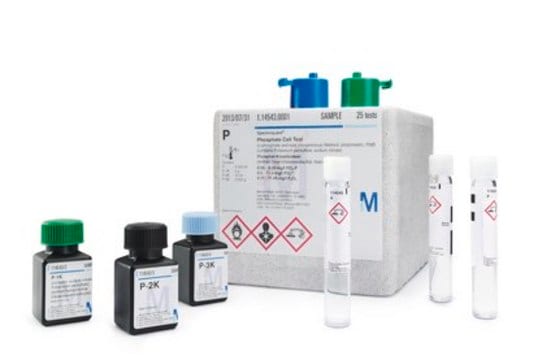1.09773
COD Test, photometric
photometric, 100-1500 mg/L (COD), Spectroquant®
About This Item
Produtos recomendados
Nome do produto
COD Cell Test (Hg-free), photometric, 100-1500 mg/L (COD), Spectroquant®
linha de produto
Spectroquant®
Nível de qualidade
uso
sufficient for 25 tests
classe(s) funcional(is) do analito
chemical oxygen demand (COD)
faixa de medição
100-1500 mg/L (COD)
técnica(s)
photometry: suitable
compatibilidade
for use with Spectroquant® Move 100
for use with Spectroquant® Nova 60 A
for use with Spectroquant® Prove 100
for use with Spectroquant® Prove 300
for use with Spectroquant® Prove 600
método de detecção
photometric (Oxidation with chromosulfuric acid, determination as chromium(III))
temperatura de armazenamento
15-25°C
Descrição geral
The Chemical Oxygen Demand (COD) is a measure for the amount of oxygen consumed during the oxidation of organic matter, which gives a clear indication for the quality of a water source, it is for sure one of the most important parameters in (waste) water analysis. Our Spectroquant® COD Tests allow you to accurately quantify the of COD levels in your sample.
These special Hg-free COD Test Kits require the samples to be free of Chloride to avoid interference and wrong results.
The Spectroquant® Cell Tests come with prefilled 16 mm round cells and all the required reagents to perform the analysis according to the instruction leaflet provided.
All Spectroquant® Cell and Reagent Test Kits are equipped with the unique Live ID (2D barcode), which allows seamless method recognition and contains essential information such as lot number, expiry date, and automatic calibration updates.
Aplicação
- Pollutant removal in an experimental bioretention cell situated in a northern Chinese sponge city.: This study evaluates the efficiency of a bioretention cell in removing pollutants from urban runoff in a northern Chinese sponge city. The research highlights the importance of innovative green infrastructure in urban water management and pollution control (Shi et al., 2024).
- Treatment of diluted palm oil mill effluent (POME) synchronous with electricity production in a persulfate oxidant-promoted photocatalytic fuel cell.: This research explores a novel approach to treating diluted POME while generating electricity using a photocatalytic fuel cell. The study demonstrates the potential for integrating wastewater treatment with renewable energy production (Yap et al., 2023).
- Influence of Fe(2)O(3) and bacterial biofilms on Cu(II) distribution in a simulated aqueous solution: A feasibility study to sediments in the Pearl River Estuary (PR China).: The study investigates the role of iron oxide and bacterial biofilms in copper distribution in aqueous solutions, offering insights into sediment management and pollution control in estuarine environments (Kurniawan et al., 2023).
- Residual pollutants in treated pulp paper mill wastewater and their phytotoxicity and cytotoxicity in Allium cepa.: This paper examines the residual pollutants in treated wastewater from pulp paper mills and assesses their phytotoxic and cytotoxic effects using Allium cepa as a model organism, underlining the need for improved wastewater treatment processes (Sharma et al., 2021).
- Evaluating nitrite oxidizing organism survival under different nitrite concentrations.: The research evaluates the survival of nitrite-oxidizing organisms at varying nitrite concentrations, providing critical insights into the optimization of biological nitrogen removal processes in wastewater treatment (Liu et al., 2020).
Informações legais
Não está encontrando o produto certo?
Experimente o nosso Ferramenta de seleção de produtos.
Palavra indicadora
Danger
Frases de perigo
Declarações de precaução
Classificações de perigo
Aquatic Acute 1 - Aquatic Chronic 1 - Carc. 1B - Eye Dam. 1 - Met. Corr. 1 - Muta. 1B - Repr. 1B - Skin Corr. 1A
Código de classe de armazenamento
6.1D - Non-combustible, acute toxic Cat.3 / toxic hazardous materials or hazardous materials causing chronic effects
Classe de risco de água (WGK)
WGK 3
Ponto de fulgor (°F)
Not applicable
Ponto de fulgor (°C)
Not applicable
Certificados de análise (COA)
Busque Certificados de análise (COA) digitando o Número do Lote do produto. Os números de lote e remessa podem ser encontrados no rótulo de um produto após a palavra “Lot” ou “Batch”.
Já possui este produto?
Encontre a documentação dos produtos que você adquiriu recentemente na biblioteca de documentos.
Nossa equipe de cientistas tem experiência em todas as áreas de pesquisa, incluindo Life Sciences, ciência de materiais, síntese química, cromatografia, química analítica e muitas outras.
Entre em contato com a assistência técnica





